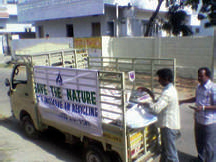Creating Wealth out of Waste
 ITC’s Wealth out of Waste (WOW) initiative is helping create awareness among the public about the advantages of the ‘Reduce-Reuse-Recycle’ process. This is a significant step in the Company’s efforts to protect the environment, improve civic amenities, as well as public health and hygiene, while generating cost-effective
raw material for the paper, plastics, metal and glass industries. ITC’s Wealth out of Waste (WOW) initiative is helping create awareness among the public about the advantages of the ‘Reduce-Reuse-Recycle’ process. This is a significant step in the Company’s efforts to protect the environment, improve civic amenities, as well as public health and hygiene, while generating cost-effective
raw material for the paper, plastics, metal and glass industries.
ITC’s Paperboards & Specialty Papers business has launched the WOW initiative in Hyderabad, Bengaluru, Chennai, Khammam District in Andhra Pradesh and Kovai District in Tamil Nadu. What started in a small way with households has now spread to schools, government offices, corporates and other institutions.
To emphasise the importance of source segregation, ITC provides special bags to accumulate dry waste like paper, plastic and metals and arranges periodic collection through outsourced agencies. The waste paper is used by ITC and the other materials are sold to the recycling industries. Segregated dry waste can save almost 40% of municipal garbage handling costs, which can be utilised to improve
civic amenities.
This unique initiative has led to the creation of significant employment opportunities. |

